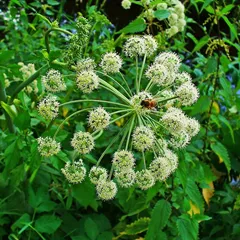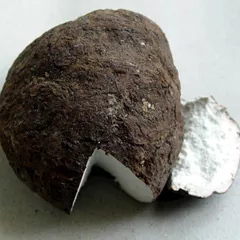Irregular menstruation according to Chinese Medicine
The information provided here is not a replacement for a doctor. You shouldn't use it for the purpose of self-diagnosing or self-medicating but rather so you can have a more informed discussion with a professional TCM practitioner.
Irregular periods, Irregular cycles, Unpredictable menstruation, Unpredictable periods and Chaotic periods redirect here
Irregular menstruation factsheet
Chinese name: 月经先后无定期
Pinyin name: Yuè Jīng Xiān Hòu Wú Dìng Qí
Possible causes and remedies:
Symptoms: Dark face Depression Irritability and eight other symptoms
Recommended formula: Xiao Yao San and one other formula
Symptoms: Dizziness Limbs pain Malar flush and five other symptoms
Recommended formula: Liu Wei Di Huang Wan and one other formula
Irregular menstruation refers to menstrual bleeding that comes sometimes early or sometimes late in an unpredictable manner. Its TCM name '月经先后无定期 (Yue Jing Xian Hou Wu Ding Qi)' literally means 'menstruation is not regular'. It is also called '经乱 (Jing Luan)' which can be translated to 'chaotic menstruation'.
It should be distinguished from early menstruation or late menstruation, which refers to conditions where bleeding cycles come respectively early or late but in a fairly regular manner. Please be aware that the cycles before the menopause and after the menarche can be irregular as well but the pathologies are different.
The Liver and the Kidneys are the two most important Organs determining the internal biological clock for menstrual cycle. It is because the Liver stores Blood and the Kidneys store Essence and both create and supply the Blood to fill the Uterus as well as the Directing and Penetrating Vessels. As we'll see, dysfunctions of these Organs are behind this condition.
As you can see below we've detailed for you the three "patterns of disharmony" associated with irregular menstruation. Chinese Medicine sees the body as a system, not a sum of isolated parts. A "pattern" is when the system's harmony is disrupted. It is not equivalent to a Western condition, as a matter of fact here irregular menstruation can be explained by three different patterns.
Each of those patterns can be treated with one or several herbal formulas. Drinking herbal infusions is the most common remedy in Chinese Medicine, together with acupuncture. It is the Chinese Medicine equivalent to drugs, apart that it's 100% natural!
In total we detail below five formulas that can help treat the various patterns that cause irregular menstruation, depending on which pattern fits your profile.
The three "patterns of disharmony" associated with irregular menstruation

The Liver is a so-called "Zang" Organ. Learn more about the Liver in Chinese Medicine
Liver Qi Stagnation
Pulse type(s): Wiry (Xian)
Tongue color: Red points on the sides
Recommended herbal formulas: Xiao Yao San, Wu Yao Tang
Symptoms: Dark face Depression Irritability Scanty periods Clots in blood Frequent sighing Breast distention Dark colored blood Abdominal distension Lower abdominal pain Pre-menstrual tension
Irregular menstruation caused by Liver Qi Stagnation as a pattern is characterized by scanty dark periods with some clots. The texture of the Blood is so sticky that women may experience difficulties to release it.
Emotional problems such as resentment, anger or frustration have a great influence on the Liver. If untreated for a while, stagnant Liver Qi can develop further to Liver Blood Stagnation. The Liver stores Blood which it supplies to the Uterus as well as the 'Sea of Blood' of the Directing and Penetrating Vessels. If this supply is disrupted, it leads to periods becoming irregular.
The treatment principle is to calm the Liver, move Qi, eliminate Stagnation and regulate the periods.

The Kidneys is a so-called "Zang" Organ. Learn more about the Kidneys in Chinese Medicine
Kidney Yin Deficiency
Pulse type(s): Rapid (Shu), Empty (Xu), Fine (Xi), Floating (Fu)
Tongue coating: Complete absence of coating
Tongue color: Red
Recommended herbal formulas: Liu Wei Di Huang Wan, Zuo Gui Wan
Symptoms: Dizziness Limbs pain Malar flush Night sweats Scanty periods Blurred vision Feeling of heat Hot palms and soles
The pathology of Kidney Yin Deficiency is similar to the one of Kidney Yang Deficiency. Sometime these two patterns may even co-exist. The periods become irregular due to the malfunction of the Kidneys which is the root Organ in creating monthly cycle Blood.
The symptoms are also quite similar apart from the Cold feeling which exists in Kidney Yang Deficiency but not Kidney Yin Deficiency. In fact, women who lack Yin - which is a natural cooling elements of the body - will rather experience Heat or Empty Heat symptoms such as malar flush, night sweats or Heat in the center of palms and soles.
The treatment principle is to nourish Yin, tonify the Kidneys and strengthen the Directing and Penetrating Vessels.

The Kidneys is a so-called "Zang" Organ. Learn more about the Kidneys in Chinese Medicine
Kidney Yang Deficiency
Pulse type(s): Deep (Chen), Weak (Ruo)
Tongue color: Pale
Recommended herbal formula: Er Xian Tang
Symptoms: Tinnitus Back pain Dizziness Dark face Weak Limbs Weak knees Poor memory Scanty periods Feeling of cold Pale menstrual blood Thin and watery periods
The Kidneys store Essence which a key component of menstruation Blood. Overwork or having too many children too close to each can negatively affect the Kidneys and result in Kidney Yang Deficiency. Then the Uterus as well as Directing and Penetrating Vessels are not filled with Blood in a consistent manner and the periods become unpredictable. Kidney disharmony is more common among older women, especially those in their 40s who undergo premature or normal menopause.
The typical symptoms of Kidney Yang Deficiency are scanty and pale menstrual Blood without clots. The Blood texture is thin and watery. Since the patients is lacking Yang, they also experience a Cold feeling.
The treatment principle is to tonify and warm the Kidneys, regulate the periods and strengthen the Penetrating and Directing Vessels.
The five herbal formulas that might help with irregular menstruation



The top herbs in Xiao Yao San are Bupleurum Roots (Chai Hu), Dong Quai (Dang Gui) and White Peony Roots (Bai Shao)
Xiao Yao San
Source date: 1107 AD
Number of ingredients: 6 herbs
Key actions: Harmonizes the function of Liver and Spleen. Relieves Liver Qi stagnation. Nourishes the Blood.
Why might Xiao Yao San help with irregular menstruation?
Because it is a formula often recommended to help treat Liver Qi Stagnation, a pattern sometimes associated with irregular menstruation. If it looks like you might suffer from Liver Qi Stagnation, this formula might help (although please seek confirmation with a professional practitioner beforehand).



The top herbs in Liu Wei Di Huang Wan are Prepared Rehmannia (Shu Di huang), Cornelian Cherries (Shan Zhu Yu) and Yam (Shan Yao)
Liu Wei Di Huang Wan
Source date: 1119 AD
Number of ingredients: 6 herbs
Key actions: Enriches the yin and nourishes the Kidneys.
Why might Liu Wei Di Huang Wan help with irregular menstruation?
Because it is a formula often recommended to help treat Kidney Yin Deficiency, a pattern sometimes associated with irregular menstruation. If it looks like you might suffer from Kidney Yin Deficiency, this formula might help (although please seek confirmation with a professional practitioner beforehand).



The top herbs in Er Xian Tang are Curculigo Rhizomes (Xian Mao), Epimedium Herbs (Yin Yang Huo) and Morinda Roots (Ba Ji Tian)
Er Xian Tang
Source date: 1950 AD
Number of ingredients: 6 herbs
Key actions: Nourishes Yin and tonifies Yang of the Kidneys. Clears Empty Heat. Regulates the Directing and Penetrating Vessels.
Why might Er Xian Tang help with irregular menstruation?
Because it is a formula often recommended to help treat Kidney Yang Deficiency, a pattern sometimes associated with irregular menstruation. If it looks like you might suffer from Kidney Yang Deficiency, this formula might help (although please seek confirmation with a professional practitioner beforehand).



The top herbs in Wu Yao Tang are Lindera Roots (Wu Yao), Coco-Grass Rhizomes (Xiang Fu) and Costus Roots (Mu Xiang)
Wu Yao Tang
Source date: 1336 AD
Number of ingredients: 9 herbs
Key actions: Pacifies the Liver. Moves Qi. Stops pain. Nourishes Liver Blood. Eliminates Stagnation.
Why might Wu Yao Tang help with irregular menstruation?
Because it is a formula often recommended to help treat Liver Qi Stagnation, a pattern sometimes associated with irregular menstruation. If it looks like you might suffer from Liver Qi Stagnation, this formula might help (although please seek confirmation with a professional practitioner beforehand).



The top herbs in Zuo Gui Wan are Prepared Rehmannia (Shu Di huang), Goji Berries (Gou Qi Zi) and Cornelian Cherries (Shan Zhu Yu)
Zuo Gui Wan
Source date: 1624 AD
Number of ingredients: 8 herbs
Key actions: Nourishes the Yin. Strengthens the Kidneys. Fills the Essence. Augments the marrow.
Why might Zuo Gui Wan help with irregular menstruation?
Because it is a formula often recommended to help treat Kidney Yin Deficiency, a pattern sometimes associated with irregular menstruation. If it looks like you might suffer from Kidney Yin Deficiency, this formula might help (although please seek confirmation with a professional practitioner beforehand).
Symptoms related to irregular menstruation
Scanty periods Dark face Dizziness Clots in blood Abdominal distension Breast distention Pre-menstrual tension Depression Frequent sighing Irritability






